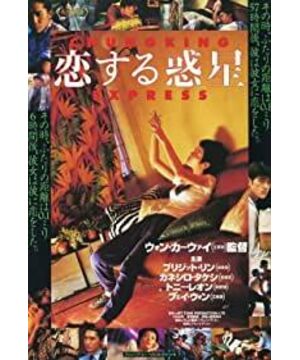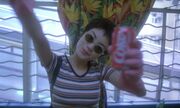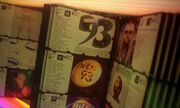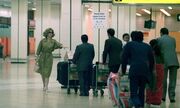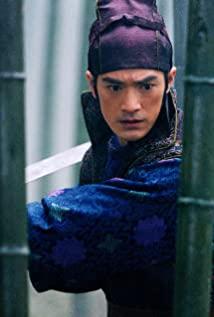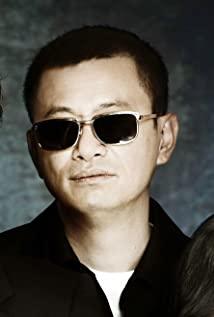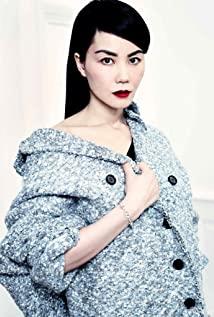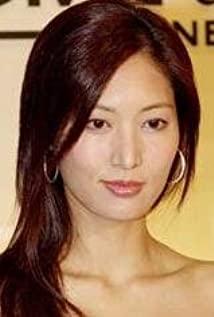The first story of "Chongqing Forest" is very vague. Wang Jiawei deliberately uses this vague narrative to conceal his true intentions. On the surface, it looks like a story of drug trafficking being chased and lost in love. The actual director has implicitly added some metaphors to it. Now let me interpret the meaning of these metaphors. There are opinions that blonde women, bar men, and bar women are in a relationship triangle, and blonde women shot and killed the bar man in order to avenge the betrayal of the bar man. The actual situation is not like this. Let’s look at the scene of the contact between the blonde woman (Lin) and the bar man. Wang Jiawei intentionally blurred the plot in the film (it seems that the barman gave Lin money to sell drugs), Lin found a group of Indians who were hiding drugs and preparing to board the flight, but the group of Indians suddenly disappeared in the ticket hall. Lin returned to the bar to find the bar man but did not find it. The bar girl gave Lin a canned food that was expired on May 1994. This date is the same as the expiration date of the canned pineapple mentioned by Takeshi Kaneshiro. This date is an important clue to uncover this obscure story. It has been mentioned by Takeshi Kaneshiro many times in this story. This has another meaning. It actually metaphors the date of Hong Kong’s return on July 7, 1997. Wong Kar-wai deliberately took it. Said to be the date of the expired canned food on May 1994, the whole story revolves around the emotions, behaviors and psychological expressions of local individuals before and before the return of Hong Kong in 1997. Lin and the bar girl here refers to Hong Kong that was colonized by the British. The yellow race and fake blond hair are symbols of the combination of Chinese and Western (Hong Kong). The bar man puts a wig on the bar girl, a metaphor for Hong Kong being colonized by the British. The intimacy refers to the fusion and mutual influence of two different cultural concepts. Therefore, there is no such a love triangle relationship as it seems in the film. Lin and the bar girl refer to Hong Kong and the bar man refers to the United Kingdom. The two are mutually beneficial and mutually beneficial. There is also no forest drug trafficking in the film. Indians hiding drugs and disappearing can be understood as a sign of the anxiety of local ordinary people about private property before Hong Kong returned to the mainland, and the mentality and behavior of wanting to hide or flee. . Take the phone and eat to dispatch. Lin wanted to escape by plane, the bar girl was still addicted, and the bar man wanted to sneak away. Before Hong Kong was about to return to the mainland, his (her) mentality was disturbed. Wang Jiawei deliberately made these meanings obscure and concealed, perhaps for fear of incurring criticism, but there are clues to follow. This seems a bit contradictory. Lin assassinated the bar man at the back door of the bar and threw away the fake blond hair. The lens also showed the foreign wine and the date on the can on May 1 of 1994. The meaning of this picture is: Lin throwing away the fake blond hair refers to Hong Kong Get rid of the colonial rule and in 1997.7. 1 (Exposed black hair: Hong Kong's local style) Returning to the mainland and killing the bar man is a hint of a "parting farewell" between Hong Kong and British rule. It's very cryptic, and it won't be easily noticed by the audience. Takeshi Kaneshiro also emphatically mentioned the date of May 1, as if he was talking about his birthday, but it is not. Jin also refers to Hong Kong, which has been colonized for a long time. Jin's birthday actually refers to the date of Hong Kong's return to July 1. . His girlfriend Amay does not exist either. The homophony of Amay is ambiguous, and it can also be understood as meaningless. In the film, Wong Kar-wai deliberately ambiguous expression of this expression. Takeshi Kaneshiro repeatedly wanted to talk to the non-existent Amay. It expresses the upset and disappointed emotions of the locals before Hong Kong is about to return to the mainland. Takeshi Kaneshiro said that after buying canned pineapple for a full month, the relationship will expire if Amay does not return on May 1st. Here, 30 days a month, it implies that Hong Kong’s return day is three years away. The homophony of pineapple is separated. After three years, Hong Kong will be separated from Britain. Another message is that in the room where Kim Jae and Lin stayed, “watched two sets of Cantonese feature films and ate four chef’s salads.” The TV shows Qing Dynasty dramas, suggesting that Hong Kong’s concession period, watching Cantonese movies and eating salad. , Implying that Hong Kong locals have already been in the heart of the contradictory complex of the fusion of Chinese and Western cultures. Let's look at Kim's monologue while running on the stadium: "A quarter of a century" and "Historic time" all hinted at the return of Hong Kong. He took off his high heels for Lin to wish Hong Kong free from colonial fate, and wiping his shoes with a tie implies that Britain will respect Hong Kong in the future. He eats pineapples, watches Cantonese films in the house, eats salads, and runs on the court are all "rituals" that refer to Hong Kong (also referring to individuals) and the British rule farewell. Such farewells also contain nostalgia and melancholy personal emotions. Ingredients, so there is no story of Jin’s broken love. He also mentioned the history of Japan's invasion and occupation of Hong Kong by Yuka Miura. In summary, Wong Kar-wai uses this vague story to express the ambivalence of most local people in Hong Kong: I love and hate Hong Kong, and I want to leave but not want to leave. The people in the latter story also have this kind of psychology, which reveals a kind of public sentiment. Let's talk about the next story. The ambivalence mentioned above is still spreading among people. It is about the complicated mentality of the local people before Hong Kong returned to China. The unnamed policeman played by Tony Leung is a representative of the local ordinary people in Hong Kong. He and the flight attendant fall in love, which is actually a kind of psychological need to look forward to a wider living space. Even more extended, it is that the individual wants to fly away from Hong Kong. But the psychological externalization of leaving. Liang Mai’s chef’s salad is a metaphor for a life culture that Hong Kong people are accustomed to. This culture is a fusion of Chinese and Western. This food also contains these two ingredients, while the fish and chips are authentic British food. I broke up with Liang after the fish and chips", a metaphor for Hong Kong people’s life culture is divided into two factions, one is accustomed to the integration of Chinese and Western, the other is completely Westernized, and the two are opposites. They are a kind of contradiction. The conflict shows the complexity of Hong Kong’s social groups. At the same time, Wong Kar-wai also metaphors his girlfriend as the life and culture of the United Kingdom that is about to leave before 1997. The unidentified departure of his girlfriend refers to the sudden departure of the British life and culture. Wong Kar-wai is here. Play "The Great Diversion of the Universe" and use the bridges of love and broken love between men and women that the audience would like to hear to conceal the true expression of their heart. Liang’s life culture is obviously the first kind of Chinese-Western fusion, which retains some national character, which is also affirmed by Wang Jiawei, but Liang shows psychological contradictions here. He likes Chinese-Western fusion and complete Westernization, which is lingering. In his bones, he "loves his ex-girlfriend deeply", otherwise he won't mumble to the items in the house after his girlfriend leaves. The airplane model is reluctant to leave in Liang's hand. On the surface, it is a symbol of a flight attendant representing his girlfriend. The deeper meaning is that Liang wants to fly away but is trapped in this place. In-depth feelings are not so much love for your girlfriend as love for this kind of feeling, including the Ko machine code of Takeshi Kaneshiro, "I love you for ten thousand years" is also the same emotional symbol. So why does Liang want to fly out of Hong Kong? This is caused by his uncertainty about the situation of Hong Kong after its return to the mainland. His worries about the future prospects of Hong Kong have caused a state of hesitation and doubt. This reflects the mentality of individual Hong Kong people. Hong Kong locals are also divided into There are two factions who want to emigrate and stay in their homeland. In this hesitant and suspicious mentality, the people who stayed behind in their homeland, such as Liang and Faye Wong, are looking for a warm "lest" to soothe this psychological anxiety. Liang is looking for a flight attendant, and Wang is looking for California. When Liang talked to himself about the items in the room after the stewardess left, he had to The flight attendant's uniform mentions the cold and uses actions to "warm up" the flight attendant uniform. The departure of the flight attendant means this kind of warm departure. Actually, it is not the coldness of the uniform, but Liang's "psychological cold". Liang didn't get back the letter from his girlfriend, because he still had the expectation that his girlfriend would come back. Faye Wong "decorated" in his home and changed some items. Wong Kar-wai created a specious image for the audience, as if it was a sleepwalking, but also as if something really happened. From Liang’s self-talking to objects, the traces left on the wall when Wang touched the wall to avoid him, and the classic line "It is still a towel with rich emotions" (Liang Zibi is a towel), all prove Judging from the delicate level of his mind, it is impossible for Liang to fail to notice the changes in his family’s belongings. It seems that Liang is indulging in the life with his ex-girlfriend, reluctant to wake up, and refuses to admit his girlfriend’s departure, causing him to treat the old belongings at home. His self-talk and his blindness to new objects are actually his sentimentality towards the life and culture of Hong Kong that is about to pass away before returning to the mainland. He is unwilling to face the unknown future. A feeling of nostalgia and self-comfort lingers in his heart. The root of Liang's "psychological cold". In Liang's self-talking paragraph, we can experience a sudden increase in sentimental sentiment. The design of this self-talking paragraph is very delicate. In the next episode of Faye Wong’s "Decoration Dreams" and Liang’s return and staying at home several times, Wong Kar-wai showed off his psychedelic style in the movie to the fullest, with illogical and perverse scenes appearing like dreams. Some props and elements are used such as: Wang Jia’s sleep aid in Liang’s bottle, the confused Garfield doll, the bubbling goldfish in the fish tank, the song of "Dream Man", etc., give these plots a strong chaos-like dream color. The audience can Thinking that Liang was “hypnotized” by the items brought by Wang, it can also be considered that Liang was deceiving himself, and Wang Jiawei gave the audience a imaginative extension space. The scenes seem to be illogical, upside-down and erroneous, but in fact the director is deliberately embellishing these dreamy and blurred plot settings, venting the emotions of the characters, and moving people's hearts with affection. Faye Wong’s dream in this film is to travel to California, which is also an emotional sign. For Wang, California is a sign of warmth and a kind of psychological comfort. She went to Liang’s house to “decorate”, more out of the psychology of looking for warmth. Wang poured flowers in Liang’s house and poured goldfish in the fish tank, which gave Liang and also gave her own mentality to add vitality and warmth. She was persistent. Enjoy the fun of "decoration". Wang’s “decoration” and Liang’s decoration of a fast food restaurant at the end are actually metaphors of “repairing” their own psychological deficiencies. What both of them lack is psychological warmth. Wang transferred the mentality of going to California to find warmth. here. "Paying electricity bills" is a very interesting metaphor. Its actual meaning refers to the warmth of people's ideals, because electricity brings warmth to people. "There are a lot of people paying electricity bills." This sentence metaphors that many local people want to find warm comfort. And what Wang said, "Sleepwalking, she is sick, she is seeing a doctor, taking medicine" is a code word for warm comfort. After being "broken" by Liang's "decoration dream" of Wang, Wang went to California to find her "California Dream". What Wang doubted was whether he was warmer in the "California Dream" of another life culture. How did it feel to fly away in a uniform? Wang was not reconciled before experiencing these two feelings, so she wanted to leave without saying goodbye. The encounter between Liang and his ex-girlfriend in the store marked the reconciliation and coexistence of two different life cultures. The meeting between Wang and Liang in the fast-food restaurant decorated was the exchange of identities when they met for the first time, and the two returned to the starting point of the initial meeting. The music of "California Dream" and the fast-food restaurant being renovated mean that a new life culture is emerging, but people have to gradually adapt to it. They have already understood that there is no such thing as a "California Dream" or a flight attendant uniform, as long as they are mentally warm, living there is the same. It is especially emphasized that Faye Wong’s performance in the play is very simple and in place, for example: her pouting expression when she pours the goldfish in the fish tank, and the scene of counting her fingers to count the time when Liang falls asleep is very warm. Faye Wong’s self-contained Cantonese in the film is really nice, any passage is a classic, especially those two passages: One paragraph is when Wang wants to take the letter to Liang Shi in front of the fast food restaurant. The other part is the Cantonese spoken by Wang Ti Jinyu when he was hit by Liang when he entered the house. There is also Liang’s classic self-talking paragraph in the room. Here, Wang Jiawei points directly to the softest part of the human heart and gently "problems", showing his extraordinary imagination. The invisible emotional atmosphere envelops the viewers. People's soft soul was touched and darkly touched by this performance, whirled and rippled.
View more about Chungking Express reviews


